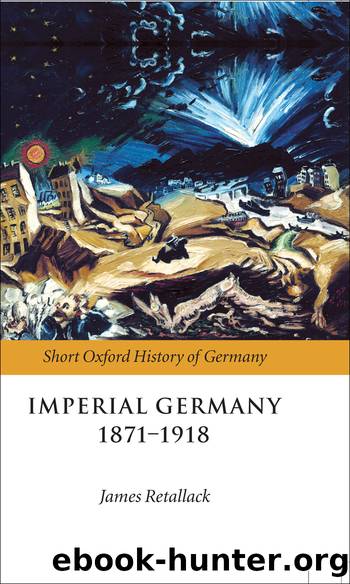Imperial Germany, 1871-1918 by Retallack James;

Author:Retallack, James;
Language: eng
Format: epub
Publisher: Oxford University Press USA - OSO
Published: 2008-10-14T16:00:00+00:00
8
Political culture and democratization
Thomas Kühne
In March 1908, political trouble was brewing in the suburbs of Cologne.1 Elections to the Prussian state parliament (Landtag) were scheduled just three months hence, and the dominant party in the electoral district of Sieg-Mülheim-Wipperfürth, the Catholic Centre Party, faced the prospect of open rebellion in its ranks. This district lay on the east side of the Rhine River and had been a secure seat for the Centre since the mid-1870s, when the mobilization of Catholic voters during the Kulturkampf made it a âbomb-proofâ bastion of party support. (The districtâs population was over 85 per cent Catholic.) Even though this district sent three representatives to the lower house of the Prussian Landtag, and even though its social profile was very heterogeneous, no other party stood a realistic chance of winning even one of those three mandates. Partly for this reason, in the spring of 1908 metal-workers in the city of Mülheim felt they deserved to have âone of their ownâ in the Landtagâa true worker, not just a candidate who adhered to the Centreâs programme or promised to lobby for working-class interests. In fact, local workers had been voicing this demand for three years. How would the Centreâs nomination committee respond?
Decades earlier, local artisans (Handwerker) had expressed their own desire for representation in the Landtag. Eventually a safe Centre seat in a neighbouring constituency was found for one of their leaders. Then in the 1890s the areaâs Catholic farmers staked their own claim, nominating an independent agrarian candidate for the 1893 Landtag elections and for subsequent Reichstag elections. This problem was temporarily solved in 1898 when Karl Becker was offered one of the districtâs three seats. However, although Becker was a farmer and executive member of the Rhenish Farmersâ Association, his principal occupation was as a justice official in Siegburg, so he was not considered a ârealâ agrarian. In 1903, when both Landtag and Reichstag elections were held, a âtrueâ farmer, Wilhelm Geyr, was offered the seat. But Geyr died in 1905 and a by-election was called. Local farmers insisted that Geyr be succeeded by another farmer (Hubert Schlick) who sprang from their ranks and understood their problems. But this insistence alienated Catholic workers, who now began their three-year campaign to secure their own nominee. They no longer wanted to be represented by someone drawn from those groups who dominated local party affairsâmainly priests, farmers, lawyers, teachers, and civil servants.
As new elections approached in March 1908, the problem seemed about to solve itself when Schlick decided not to stand for reelection: at last a safe seat was available for a worker. But the farmers again dug in their heels. Eventually an alternative solution was found: a judicial official who had held one of the three Landtag seats since 1893 and who also sat in the Reichstag, was persuaded to step down as Landtag deputy and devote himself entirely to his duties in Germanyâs national parliament. A railroad worker from Dortmund, locksmith Heinrich Beyer, was nominated in his place.
Download
This site does not store any files on its server. We only index and link to content provided by other sites. Please contact the content providers to delete copyright contents if any and email us, we'll remove relevant links or contents immediately.
| Africa | Americas |
| Arctic & Antarctica | Asia |
| Australia & Oceania | Europe |
| Middle East | Russia |
| United States | World |
| Ancient Civilizations | Military |
| Historical Study & Educational Resources |
Magic and Divination in Early Islam by Emilie Savage-Smith;(1455)
Ambition and Desire: The Dangerous Life of Josephine Bonaparte by Kate Williams(1279)
Papillon by Henry Charrière(1261)
Bohemians, Bootleggers, Flappers, and Swells: The Best of Early Vanity Fair by Bohemians Bootleggers Flappers & Swells- The Best of Early Vanity Fair (epub)(1259)
Twelve Caesars by Mary Beard(1139)
Operation Vengeance: The Astonishing Aerial Ambush That Changed World War II by Dan Hampton(1111)
What Really Happened: The Death of Hitler by Robert J. Hutchinson(1070)
London in the Twentieth Century by Jerry White(1050)
Time of the Magicians by Wolfram Eilenberger(1027)
Twilight of the Gods by Ian W. Toll(1023)
The Japanese by Christopher Harding(1018)
Lenin: A Biography by Robert Service(982)
The Devil You Know by Charles M. Blow(932)
Freemasons for Dummies by Hodapp Christopher;(889)
A Social History of the Media by Peter Burke & Peter Burke(885)
Napolean Hill Collection by Napoleon Hill(860)
The Churchill Complex by Ian Buruma(857)
The Rise and Triumph of the Modern Self by Unknown(853)
Henry III by David Carpenter;(850)
